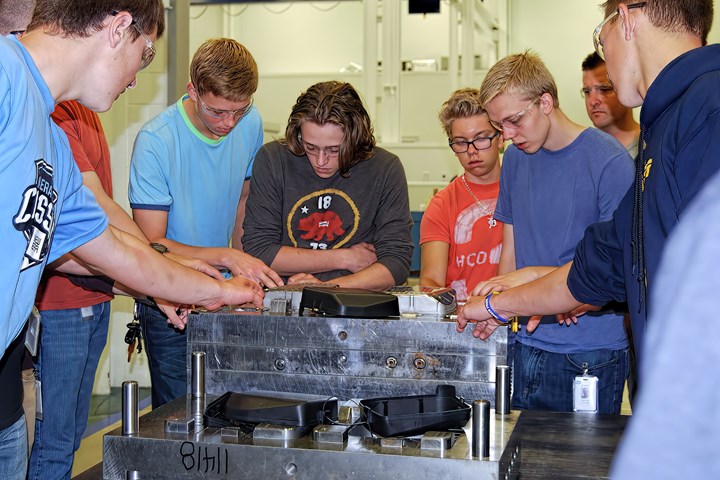
Are Plastics on the ‘Wrong Side of History’?

With so much negativity in the press about plastics, the next generation of industry employees has to learn the truth about plastics’ role in society. There’s no better way than to bring young people into your plants to show them how things really work, like this program for high schoolers at PTI Engineered Plastics, Macomb, Mich. (Photo: PTI Engineered Plastics)
Of all the challenges that plastics manufacturers face today, at or near the top of the list is the difficulty in finding people to work in the industry. A decades-old undercurrent of chemophobia (fear of all things chemical) that is endemic in our society has been inflamed nowadays by sensational reports of ocean pollution by plastics and accusations of enabling climate change.
What young person whom you might want to recruit for a job in plastics has not seen (or heard of) pathetic photos of baby sea turtles tortured by plastics or dolphins drowned in discarded plastic fishing nets? What potential employee recruit has not been bombarded by messages that plastics come from fossil fuels and therefore contribute to climate change?
This comes at a time rife with efforts at every level of government – municipal, county, state and federal – to restrict production, sale and use of plastics – and even, in some cases, implementation of new technologies for recycling plastics. (It makes you wonder whether some people fear that advanced recycling might succeed too well and give plastics a new lease on life.) The most radical of these proposals would halt any expansion of plastics resin production capacity to limit any further threat to the planet.
I was invited to consider such matters in a recent discussion with friends about my career at a publication serving Public Enemy Number One (or Number Two, after the fossil fuels industry). Is it possible, I was asked, that plastics are simply on the wrong side of history?
I jumped on that one — hard. The only history I could imagine without plastics would be some sort of post-apocalyptic “Mad Max” dystopia that had been deprived – whether by war, pestilence, zombie outbreak or alien invasion – of a chemical industry and even of electricity.
My key point was this: Don’t think about plastics like you do about automobiles. Some day, maybe, we will all be driving electric cars. But we won’t be living without plastics – in fact, we’ll be using even more of them.
The future of e-mobility, or any land or air mobility, depends on use of lightweight materials, and that means plastics. The future of improved medical care means lots more plastics in devices and packaging. And can anyone imagine – or want to imagine – a future without electricity, smart devices, computers? All of those are un-imaginable without plastics. And where will all those electric vehicles be without the plastics that are essential to generate, transmit and store electricity? Will they have wires insulated with cotton, shellac and gutta percha? Without plastic composites, will we get our energy from windmills made of wood and fabric, like in old Holland? (Fuhgetabout solar panels!)
And what about the tires for EVs? How many tropical forests would have to be razed to grow enough natural rubber – since, to be honest, synthetic rubber is not really different from plastics in its chemical origins. And aren’t mountains of used tires an environmental threat in multiple categories?
And let’s not forget about synthetic fibers, which are basically plastics. They’re accused of releasing micro-fibers into the air and water. Who’s going to grow all the cotton and raise all the sheep to replace them?
What about food packaging? If the world is suffering food shortages today, what will it be like without plastic packaging and storage containers to avoid spoilage and shipping damage. Are there enough trees in all the world to replace every bit of plastic film with paper? How much paper food packaging today does not have a plastic liner or coating as a barrier to water and grease? (What’s inside your breakfast cereal box? A plastic bag liner.)
Can anyone really picture replacing every plastic container in their kitchen, bathroom and backpack with glass or metal? Besides the weight and breakage, production of glass, metal and paper all involve more energy consumption and greenhouse gas emissions than does use of plastics.
What are the two most exciting new technologies that everyone is buzzing about? Artificial intelligence (AI)? Not without electricity (see above) and computers with numerous plastic connectors, housings and encapsulated microelectronics. Additive manufacturing (3D printing)? That’s mostly another way of using plastics (some metal, too).
On the wrong side of history? Unless some space aliens come down and introduce us to a hitherto unknown class of matter, plastics are the future. There simply is no substitute compatible with modern society or any society that most of us would want to live in.
Yes, plastics can be lightweighted, recycled and used more responsibly – but they’re here to stay. And somebody has to produce them and process them. (And write about them.) Sell that at your next plant open house for high school or college students or other potential new hires.

Leave a Reply